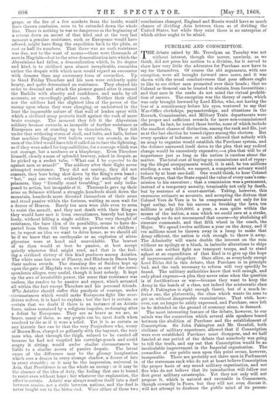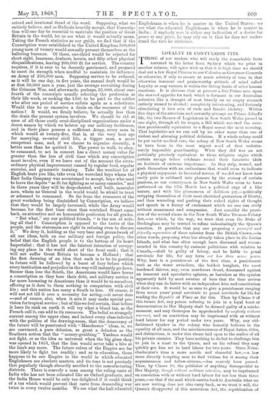PURCHASE AND CONSCRIPTION.
THE debate raised by Mr. Trevelyan on Tuesday was not without interest, though the mover, unwisely, as we think, did not press his motion to a division, for it served to
show how very little the advocates for Purchase now have to say for themselves. Of course the old arguments, with one exception, were all brought forward once more, and it was shown with the usual conclusiveness that poor officers ought to like to see richer men promoted over their heads ; that no Colonel or General can be trusted to abstain from favouritism ; and that men in the ranks do not mind the virtual prohibi- tion of careers. The exception was the theory of caste, which was only brought forward by Lord Elcho, who, not having the fear of a constituency before his eyes, ventured to say that War-Office clerkships, paymasterships, and situations in the Barrack, Commissariat, and Military Train departments were the proper and sufficient rewards for mere non-commissioned officers. In fact, he tossed those berths, none of which include the smallest chance of distinction, among the rank and file, just as at the last election he tossed cigars among the electors. But every speaker of influence or merit allowed that nobody with an army to organize would establish the Purchase system, and the defence narrowed itself down to the plea that any radical change would be excessively expensive,—a plea that will be of importance just as long as the nation is careless about the matter. The total cost of buying up commissions and of repay- ing the illegal overpayments would, it is said, be ten millions sterling, a sum which, we suspect, a competent actuary would reduce by at least one-half. One would think, to hear Colonel North argue, that the State repaid the value of every man's com- mission to his executors ; that a commission was a permanent, instead of a temporary annuity, terminable not only by death, but by sentence of a court-martial. Taking, however, this enormous estimate as accurate, and accepting the dictum that Colonel Vere de Vere is to be compensated not only for his legal outlay, but for his success in breaking the laws, ten millions is only 350,0001. a year, a sum quite within the means of the nation, a sum which we could save at a stroke, —though we do not recommend that course—by abolishing all sinecure commands, and that fifth wheel in the coach, the Major. We spend twelve millions a year on the Army, and if ten millions must be thrown away in a lump to make that Army efficient, the nation is rich enough to throw it away. The Admiralty will waste double the interest on the sum without an apology or a blush, in imbecile alterations to ships which can neither fight nor transport troops, and to stand aghast at an expenditure of that kind is to give up the hope of improvement altogether. Once allow, as everybody except Lord Elcho did in this debate, that Purchase is in principle bad, and the cash necessary to reform will very speedily be found. The military authorities know that well enough, and only plead expense—a plea they never raise when the question is of fortifications or war—because they want to keep the Army in the hands of a class, not indeed the aristocratic class (Sir J. Pakington is right enough there), but of a much in- ferior one, the plutocratic, the class which wants its sons to get on without disagreeable examinations. That wish, how- ever, can no longer be safely expressed, and Purchase, once left to be defended on the ground of economy alone, is doomed.
The most interesting feature of the debate, however, to our minds was the connection which several able speakers traced between the abolition of Purchase and the establishment of Conscription. Sir John Pakington and Mr. Grenfell, both civilians of military experience, allowed that if Conscription were ever established Purchase must disappear, and we half fancied at one period of the debate that somebody was going to tell the truth, and say out that Conscription would be an incalculable improvement in the Imperial organization. The cowardice of our public men upon this point seems, however, insuperable. There are probably not three men in Parliament of the statesman rank who do not at heart believe Conscription the proper basis of any sound military organization, and not five who do not believe that its introduction will follow our first great military catastrophe. Yet they not only will not propose it, which is natural and excusable in Commoners, though cowardly in Peers, but they will not even discuss it, will not attempt to disabuse the public mind of its precon- ceived and irrational dread of the word. Supposing, what we entirely believe, and as Radicals heartily accept, that Conscrip- tion will one day be essential to maintain the position of Great Britain in the world, let us see what it would actually mean. Taking the French statistics as our guide, we find that if the Conscription were established in the United Kingdom 300,000 young men of twenty would annually present themselves at the balloting bureaux. Of these, one-third would be rejected for short sight, lameness, deafness, hernia, and fifty other physical disqualifications, leaving 200,000 fit for service. The country requires, if it is ever to be decently garrisoned, and prepared to exert its strength when needful to maintain its influence, an Army of 250,000 men. Supposing service to be reduced, as it will be one day, to five years, the annual draft would be at first 50,000 men a year, just the average recruiting during the Crimean War, and afterwards, perhaps, 35,000, about one- fourth of the conscripts usually selecting the profession as their life work, or seeking the 1501. to be paid to the soldier who after one period of service enlists again as a substitute. Would this be so excessive a drain on the resources of the nation ? It would, we firmly believe, be actually less than the drain the present system involves. We should be rid at once of all those costly semi-disciplined organizations under a dozen names by which we bolster up our military feebleness, and in their place possess a sufficient Army, every man in which would at twenty-five, that is, at the very best age for marrying, re-enter civil life, a bigger man, a more competent man, and, if we choose to organize decently, a better man than he quitted it. The power to walk, to obey, to command, to act in concert has a direct money value far greater than the loss of civil time which any conscription must involve, even if we leave out of the account the extra- ordinary physical improvement caused by regular food, regular exercise, and gymnastic training. Take the weediest lot of English louts you like, take even the wretched boys whom the East India Company was accustomed to accept, boys who used to leave the depots "as fit for fighting as so many canaries," and in three years they will be deep-chested, well built, muscular men, whom no General in the world would be afraid to trust or ashamed to command. So far from the resources of the great workshop being diminished by Conscription, we believe that they would be largely increased, while the Army would become, for the first time since that wretched Stuart came back, an attractive and an honourable profession for all grades.
" But what," say our political friends, " is the use of writ- ing all that ? Conscription is opposed to the tastes of the people, and the statesmen are right in refusing even to discuss it." We deny it, holding as the very base and groundwork of all our ideas, both on our military and foreign policy, the belief that the English people is to the bottom of its heart Imperialist ; that it has not the faintest intention of occupy- ing any place in the world short of the front rank ; that it will not suffer Great Britain to become a Holland ; that the first dawning of an idea that such is to be its position in future will be followei by a burst of fury before which every institution and prejudice in the way will instantly go down. Sooner than lose the South, the Americans would have borne a conscription as they bore their debt, and military service is far more harassing to Americans than it would be to ourselves, offering as it does to them nothing in comparison with civil life ; and this nation has many a South to lose. Of course, it will not act till it sees a necessity for acting,—it never does —and of course, also, when it acts it may make special pro- vision for tropical service ; but of this we feel certain, that before it loses its rank on earth it will try what a blood tax, as the French call it, can add to its resources. The belief so strangely current among the upper class, and indeed every class infected with the politics of the drawing-room, that the democracy of the future will be penetrated with " Manchester " ideas, is, we are convinced, a pure delusion, as great a delusion as the Southern notion that the " money-grubbing " Yankees would not fight, or as the idea so universal when the big glass shop was opened in 1851, that the lion would never take a bite at the lamb any more. The future rulers of the Empire are far more likely to fight too readily ; and as to education, there happens to be one Empire in the world in which educated Englishmen are absolute masters, and its tone is not precisely that popularly though absurdly ascribed to the manufacturing districts. There is scarcely a man among the ruling caste of India who has not been educated like an Oxford graduate, and the India House would be only too delighted if it could think of a tax which would prevent that caste from demanding war twice in every twelve months. We see what the half educated
Englishman is when he is master in the United States ; we see what the educated Englishman is when he is master in India ; if anybody sees in either any indication of a desire for peace at any price, he may rely on it that he does not under- stand the race he criticizes.



































 Previous page
Previous page